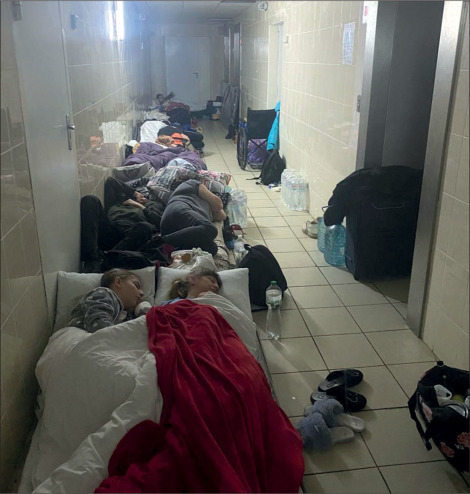
Source: Lancet Oncology
Ukrainian oncologists have been adapting their chemotherapy regimens and performing procedures outside bomb shelters so cancer care can continue in the war-torn country.
With the Russian military invasion now in its third month, oncologists on the ground say resources are seriously limited, with shortages of key drugs and hospital beds still major issues.
Given the technological complexity and the need for a stable electricity supply, radiotherapy is completely off the table.
But the specialty has found ways of meeting the challenge, according to Dr Oleksandr Stakhovskyi and Dr Viacheslav Kopetskyi from the National Cancer Institute in Kyiv.
Writing in Lancet Oncology last week, they said male doctors were required to stay under wartime rules banning males aged between 18-60 from leaving the country.
“The first nights were sleepless with constant phone checking,” they wrote.
“News about Russian troops failing to succeed quickly provided hope. However, with news of civilian districts getting shelled every day, it became clear that hospitals might not be safe.”
“Personal safety remains a daily consideration.”
The strict hierarchy that traditionally governed oncology care in Ukraine was among the first things to go, thanks to the unpredictability of the situation and need to adapt to new threats at short notice.
“The attending physicians grew more autonomous in determining patient management and arranging patient evacuation to safer parts of the country or abroad,” the authors said.
While paediatric patients with solid tumours and haematological malignancies were evacuated in the early stages of the war, piecemeal approaches were needed to provide treatment for the rest.
As a result, the National Cancer Institute – Ukraine’s top oncology centre – had a major overhaul, as nursing and support staff were housed in the hospital to ensure their safety and availability.
“Procedure rooms have been relocated to lower floors, closer to bomb shelters,” the authors said.
“Only outpatient services, such as supportive therapy, bloodwork, and chemotherapy, remain available.”
While changes had been made, the doctors stressed more help was needed, adding no new patients had been accepted at the centre since the start of the invasion.
Palliative care centres had also become overloaded, they said.
“Cancer treatment loses priority during armed conflicts, shelling, and bombing of civilian targets, but patients with cancer do not vanish,” the authors wrote.
“Oncology specialists have to make personal choices, adapt to a new work reality, and learn how to interact with the military.
“Keeping in mind an everyday danger, they must assure patient safety and continue their work without previously available diagnostic and clinical support.
“Nobody was prepared, but specialist care is still needed.”
The article was co-written by doctors at Mercy Hospital, Baltimore’s, Institute for Cancer Care, who formed a social media group with their Ukrainian colleagues shortly after the invasion